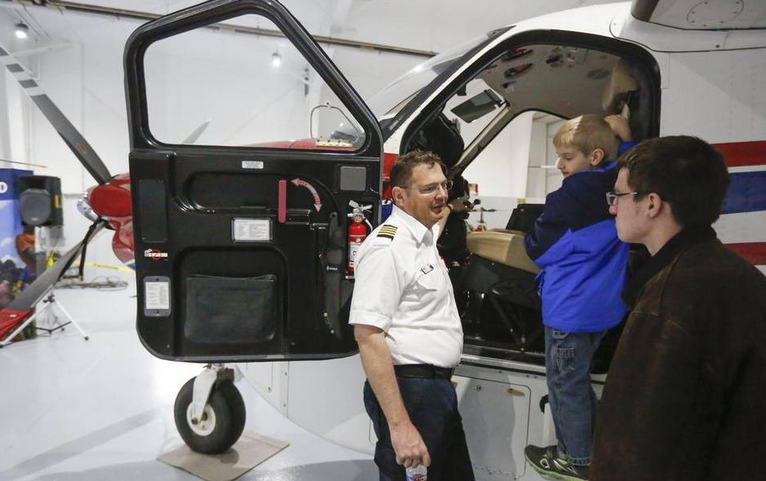
By Roy Wenzl
In Haiti one day, a doctor turned to the pilot Will White and asked him to pitch in and do some medical work at a clinic looking after desperate poor children.
White demurred at first. “I’m a pilot. What good am I gonna do?”
But then he set to work – washing feet.
On Saturday, as he showed Wichitans the Kodiak turboprop plane he used during relief flights in Haiti last year, he said stories like this one will stick in his mind for life. And it didn’t even involve airplanes.
White, 48, is a 20-year veteran pilot for the Mission Aviation Fellowship, which saves lives, heals the sick and spreads Christian gospel around the globe.
A simple cut foot could instantly become infected and become a life-threatening crisis.
Will White, pilot for the Mission Aviation Fellowship
The kids he treated that day were too poor to have shoes, and had cut their feet walking around in the muddy little hamlet where they were growing up.
“There was animal feces lying around, muck and grime everywhere. The people had no fresh water to wash, or Band-Aids,” White said. “A simple cut foot could instantly become infected and become a life-threatening crisis.”
Mission Aviation Fellowship flies 135 planes across Africa, Asia, Eurasia and Latin America, operating what they say is the world’s largest fleet of aircraft used for nonprofit humanitarian work. White brought the plane for an open house visit at Mid-Continent Aviation Services in Wichita as part of his group’s ongoing attempt to recruit, raise funds and spread the Christian word.
The muscular and rugged Kodiak turboprop favored by the mission can carry substantial loads, and take off and land on runways only 1,500 feet long. He’s proud to show it off.
White grew up in Dallas. Twenty years of flying missions for the Mission Aviation Fellowship has given White the chance to save lives, spread the Christian gospel – and appreciate the United States, even while living for 15 years in Haiti.
“It reminds me that we are extremely blessed in America every time we turn on the tap and get water, every time we flip on a switch and get lights,” he said. “Most people in the world don’t have that.”
“What many of them have is where you see little kids 4 or 5 years old, walking several hours to find dirty water every day and then haul it home in buckets,” he said. “In Haiti there is a lot of cholera and other waterborne illnesses. You get a worldview doing this work of the struggles these people go through.”
Occasional clinic work aside, most of what he does is fly doctors and other relief workers around. But that saves many lives by saving time. “Some of the out-of-the-way places we take doctors into, for example – a trip that takes us 20 minutes to fly, while the doctor riding in a car might have to ride four hours to get there, and while the doctor is riding he’s not treating anyone.”
You see little kids 4 or 5 years old, walking several hours to find dirty water every day.
Will White, pilot for the Mission Aviation Fellowship
He has flown banana plants to an Indonesian village on the verge of starving. And now that village has an orchard of banana trees that help sustain it.
Sometimes all he has done is fly gardeners to places where everybody has to raise their own food. And the gardeners taught them how to garden.
Some flights are more memorable.
“A couple months ago in Haiti, we got a call asking us to wait for a sick guy in bad shape. He’d been misdiagnosed in a local clinic. I didn’t think he looked all that bad, but when we got him to a hospital in Port au Prince, they told us if we hadn’t gotten him in there, he’d have died.
“Then there was the orphanage. A Haitian organization was having a tough time feeding its kids. So we worked with a guy who raises tilapia, a fast-growing fish. We flew 1,500 baby tilapias in coolers, and they had a pond ready to go … and now they have a self-sustaining protein for their kids.
“I can go back there now and say, ‘Hey, those big fat fish in there? I flew them in, and helped feed those kids.’ ”